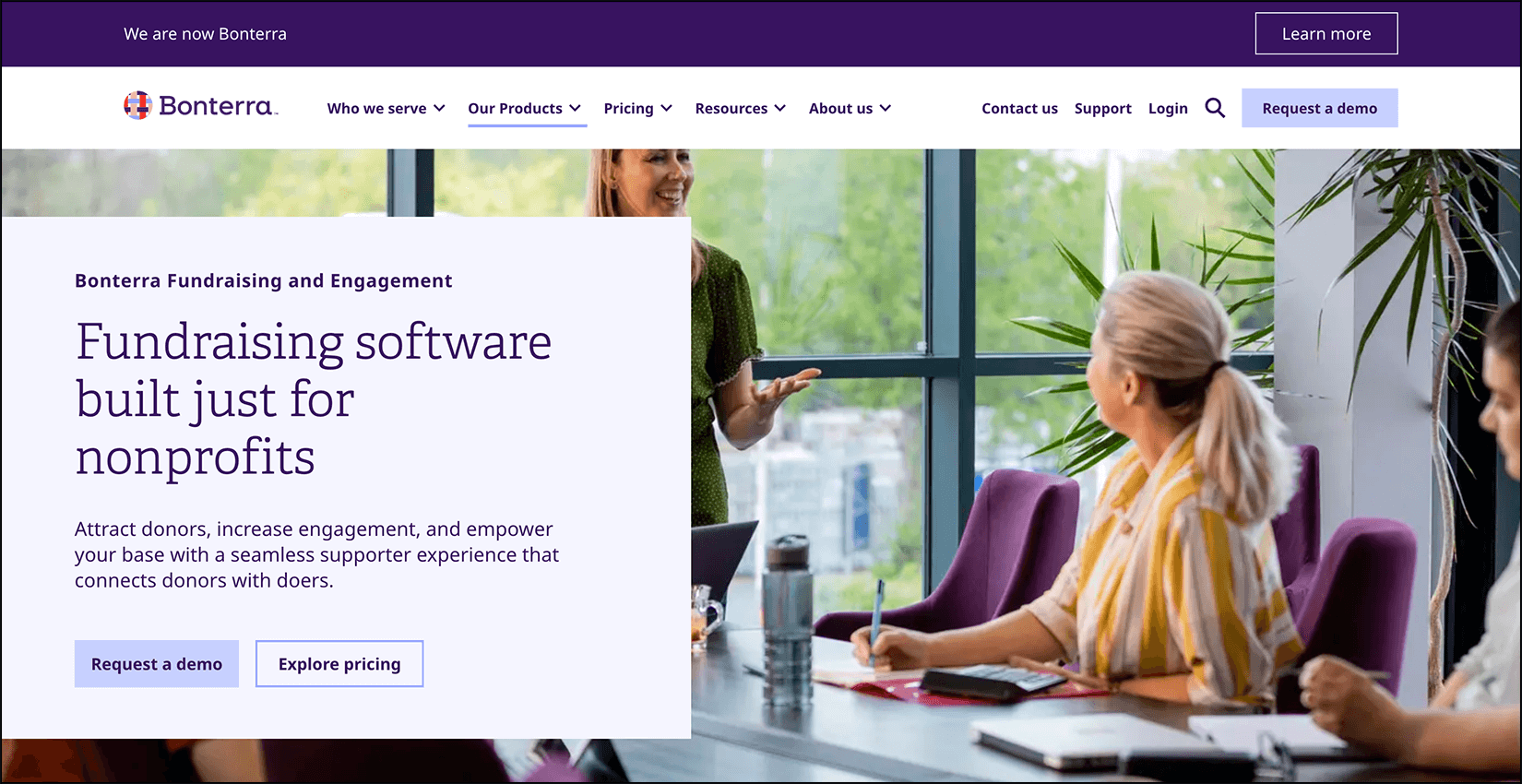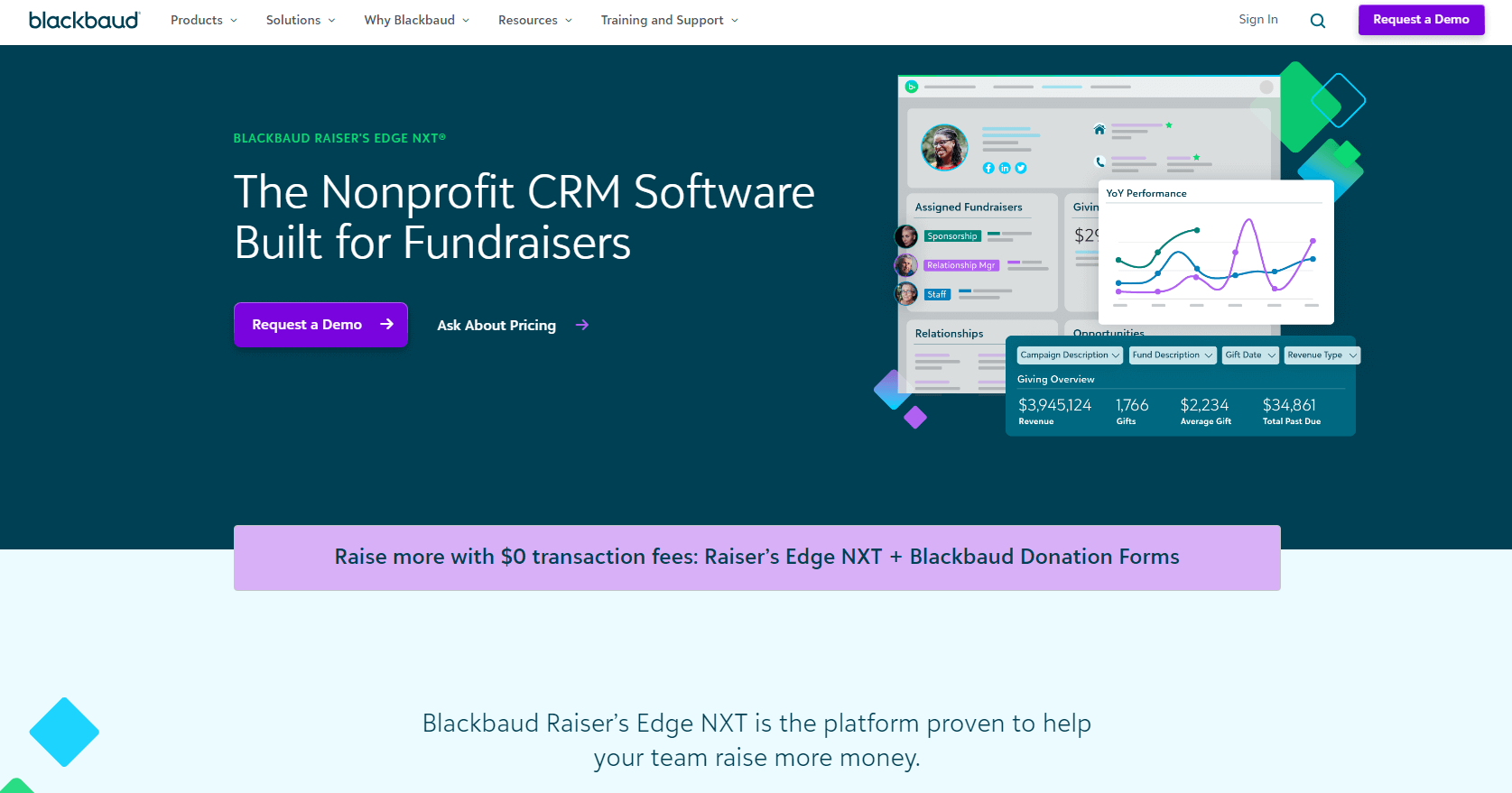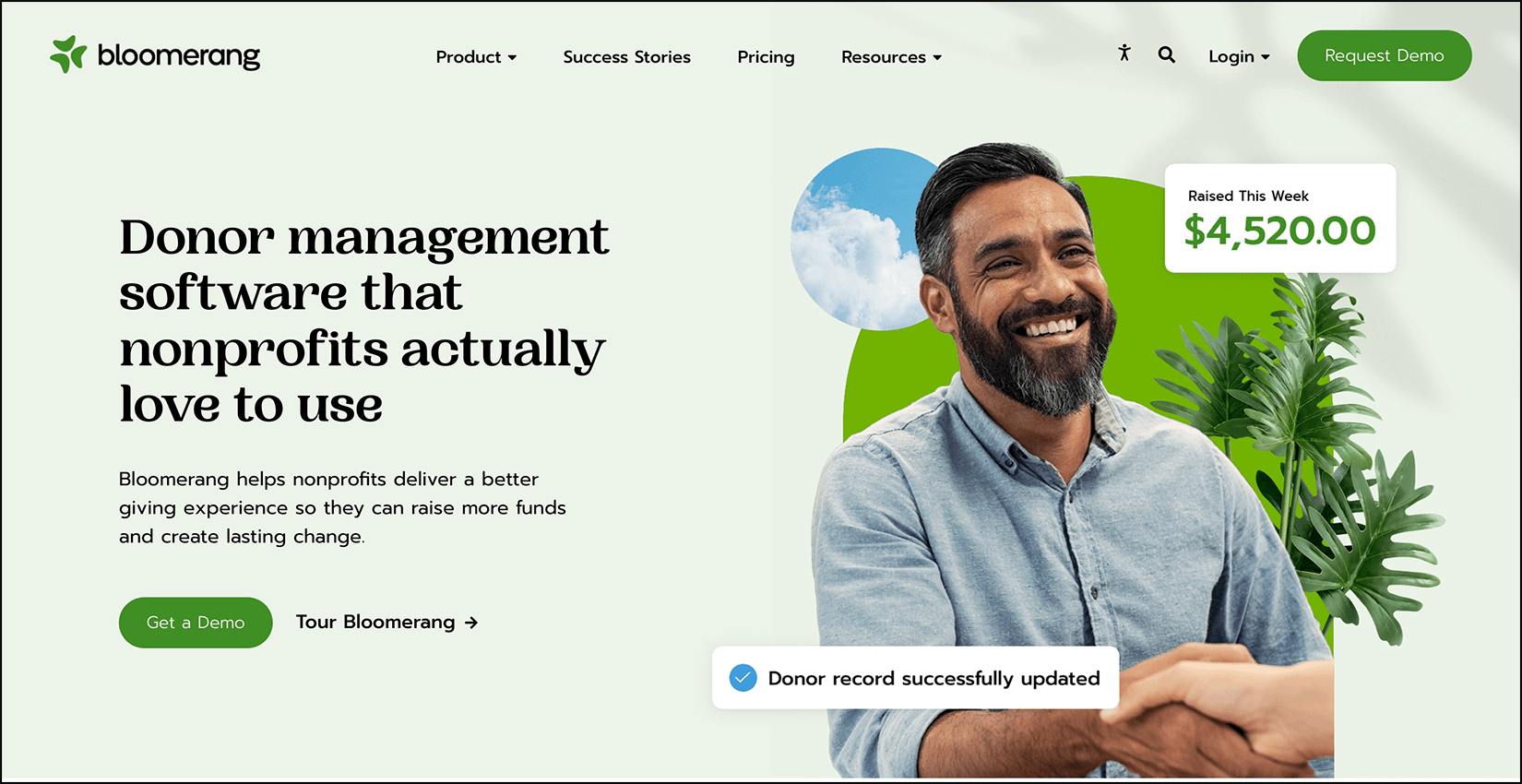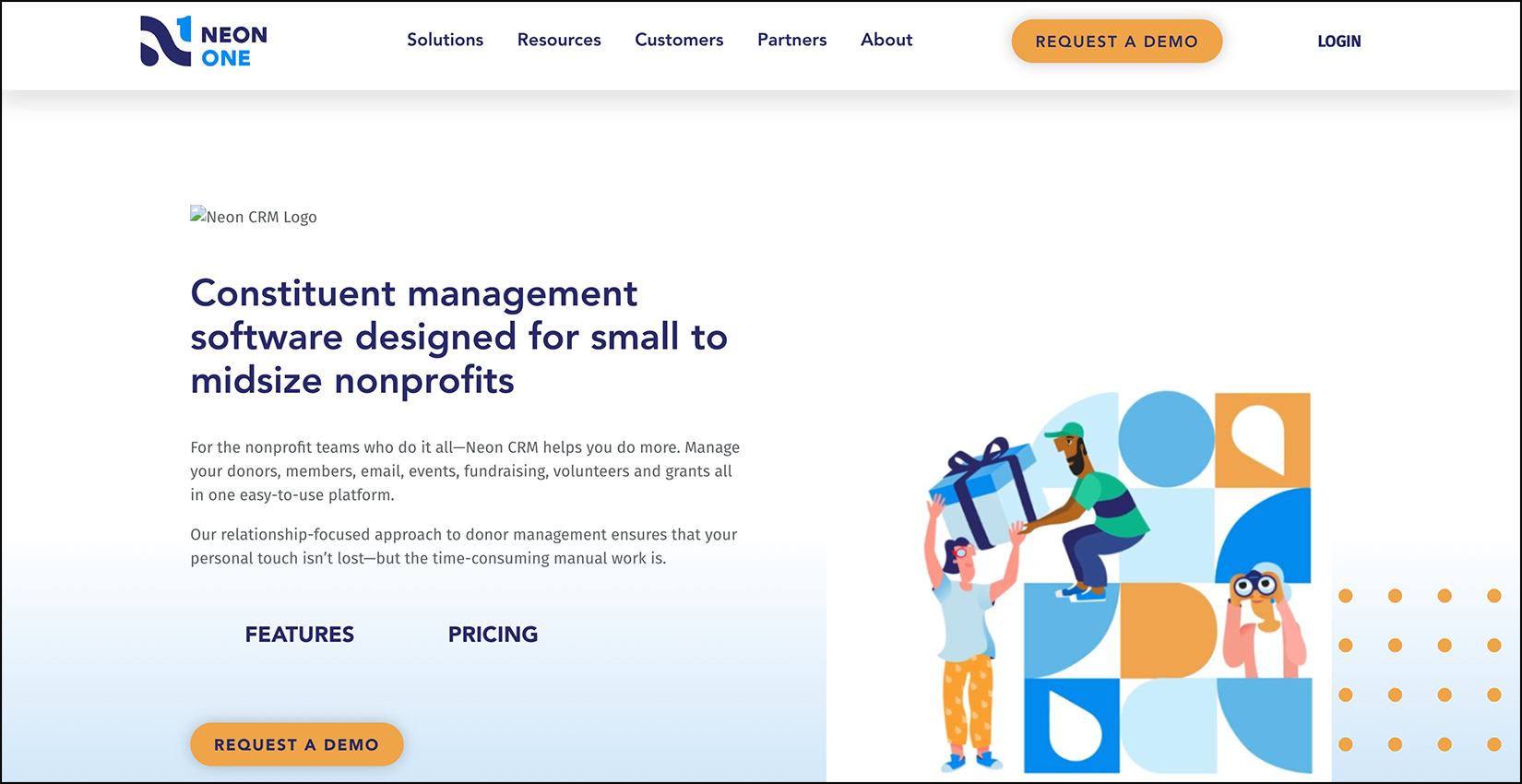Constituent relationship management (CRM) systems are a strategic investment that can help propel your nonprofit organization to its peak impact. If your current system isn’t serving your organization well or you’re ready to scale up to a new, more robust solution, seeking out a better nonprofit CRM can make a world of difference.
The right CRM for your nonprofit’s unique needs will help you save team time and maximize your impact, but how do you find the right one? Explore our list of the top 20 CRMs for nonprofits and their key features to begin your search.
Need a thorough guide to evaluating the tools and features you’ll need before you dive in? Download our complete nonprofit CRM buyer’s guide for free.
What is a nonprofit CRM?
A nonprofit CRM, also called a donor database or donor management system, is a digital platform that stores your donor data. It helps you compile important information about individual supporters which you can use to tailor fundraising campaigns, personalize communications, and streamline operations.
While your organization can use a CRM designed for for-profit businesses, you’ll get more out of your system if you choose a solution built for nonprofits. These databases specifically serve nonprofit needs and often come with additional fundraising features.
Why are CRMs for nonprofits important?
Your CRM is an essential tool for maximizing your nonprofit’s fundraising efforts. With this powerful technology, you can manage donor data, engage supporters, and run successful fundraising campaigns, all from one central location.
Additionally, quality nonprofit CRM software eases the administrative burdens of campaign planning, streamlining time-consuming tasks like data entry and reporting. From analyzing donor data to automating outreach, it helps your nonprofit:

- Save time: Powered by automated and integrated processes, your nonprofit CRM will save your team time that would have otherwise been spent switching between systems and manually migrating data.
- Enrich donor relationships: The more you know about your donors, the better you’ll be able to solicit and retain their support. Use the comprehensive donor data in your CRM to personalize communications and make more relevant, compelling asks.
- Raise more funds: With the right tools, you can increase your fundraisers’ efficiency and maximize results. Custom outreach templates and automated reporting features consolidate information so you can easily and quickly put your fundraising data to use.
Plus, with a reliable and secure place to store information, you can make better-informed decisions about other initiatives, such as your marketing and event planning efforts.
But first, you have to find a solution that aligns with your nonprofit’s budget, goals, and fundraising needs. That’s where our list comes in.
The 20+ best nonprofit CRMs
If you’re ready to choose a new CRM, explore our list of the best databases designed for nonprofits. We’ll discuss why each system stands out and their top features.
Bonterra Fundraising + Engagement: The best CRM for nonprofits

Bonterra Fundraising + Engagement (previously EveryAction) is more than just a nonprofit CRM. It’s a unified set of fundraising and donor engagement tools designed to give your supporters the best experience possible. Fundraising + Engagement combines a robust CRM for nonprofits with best-in-class communication, volunteer management, and event management tools — all in one convenient location.
Standout features
Some of the best features Fundraising + Engagement has to offer include:
- Multi-channel, automated workflows to minimize the time you spend on outreach while boosting donor engagement
- Custom contribution fields for donor profiles to ensure you can collect unique data points that matter to your nonprofit
- FastAction network of over 20 million profiles storing donor’s payment information so they can give with just one click even if they haven’t given to your organization before
- Predictive analytics of your donor profiles to help you determine the best prospects for planned giving, sustainer programs, and donation upgrades
- Optimized Ask amounts that provide suggested donations for individual supporters based on their historical behavior
- Advocacy and action tools to help you mobilize volunteers and make it easy for them to take action
- Events, auctions, and giving days so you can meet your fundraising goals quickly and manage everything in one place
Why choose Bonterra?
Fundraising + Engagement was designed to support Bonterra’s vision of connecting social good organizations, community members, and grantmakers so we can all achieve more impact, together. Our platform includes a network of over 16,000 nonprofits using our tools to make a difference.
Our nonprofit CRM provides you with one set of fundraising and engagement tools so you can give your supporters a unified, streamlined experience. There’s no need to purchase and integrate six different fundraising software solutions on your own — Fundraising + Engagement includes everything you need, in one place.
Pricing tiers
We know that all nonprofits have unique needs and budgets, so we offer three platform tiers and pricing customized to your organization. Explore our pricing page or reach out to our team for more information.
Ready to see what Fundraising + Engagement can do for you? Request a demo and get customized pricing today.
Blackbaud Raiser’s NXT

Best for: Mid- to large-sized organizations in need of a large, robust nonprofit CRM
Blackbaud’s Raiser’s Edge NXT is a popular choice for nonprofits with large contact databases. This system includes a variety of automation tools to help you discover new donor insights, along with:
- A Major Giving Work Center to help you cultivate major gifts
- Custom analytics and reporting dashboards
- Recurring giving and pledge management tools
Drawbacks of this nonprofit CRM: Since Blackbaud is one of the most complex options on this list, you’ll likely need to spend extra time and money on the implementation and training process. Many nonprofits hire an outside consultant just to set up the platform and ensure they can use it effectively.
Salesforce Nonprofit Cloud

Best for: Large and enterprise-level nonprofits that want a highly customizable platform
Salesforce’s newest CRM offering for nonprofits, Nonprofit Cloud, is an integrated platform that includes fundraising, program management, and case management capabilities. A few of the system’s features include:
- Comprehensive fundraising dashboards to manage giving lifecycles with both supporters and businesses
- Program attendance and benefits tracking
- Dynamic participant assessments and care plans
Drawbacks of this nonprofit CRM: Although Nonprofit Cloud is designed exclusively for nonprofits, the Salesforce platform that it’s built on is not. Salesforce, as the name implies, mainly caters to sales teams and for-profit businesses. Nonprofits may also be confused by the other nonprofit product Salesforce offers, the Nonprofit Success Pack (NPSP), which is really a collection of apps layered on top of the base sales CRM.
Givebutter

Best for: Nonprofits on a tight budget that don’t need all the bells and whistles
Givebutter is a basic nonprofit CRM that organizations can get started with at no cost. It provides essential features like:
- Payment processing for cash, Venmo, PayPal, and Apple Pay donations
- Contact profiles that include donation and engagement histories
- Basic donor segmentation and reporting tools
Drawbacks of this CRM: Since Givebutter is a “free” nonprofit CRM, it’s much more basic than other comprehensive solutions, meaning features are limited. A “free” CRM also means high processing fees which are often passed onto your donors. You also must include the option for donors to tip the Givebutter platform, or they charge an additional platform fee.
CharityEngine

Best for: Nonprofits with a large budget searching for a scalable solution to support their growth
CharityEngine’s CRM for nonprofits is designed to be scalable for nonprofits of all sizes who might eventually need enterprise-level support. This platform’s features include:
- Email marketing automation with conversion tracking and analytics
- Customizable landing pages and donation forms
- Inbound text-to-give capabilities for mobile fundraising
Drawbacks of this nonprofit CRM: CharityEngine is one of the more expensive solutions on this list, and users complain that it’s overly complicated with insufficient training and set-up options.
DonorPerfect

Best for: Nonprofits in need of an affordable CRM with strong customer service
DonorPerfect is a flexible constituent database that also includes event support, online giving, and donor communication tools. The core platform comes with:
- Comprehensive reporting and dashboard analytics
- Integrated payment processing, donation forms, and volunteer forms
- A mobile app for both iOS and Android
Drawbacks of this CRM for nonprofits: Many DonorPerfect users say that the platform isn’t intuitive, especially regarding data imports and integrations. The CRM also offers limited integrations in general.
Bloomerang

Best for: Smaller, growing nonprofits without much technical expertise
Bloomerang is a nonprofit CRM for small to mid-size organizations that comes with a highly responsive customer service team. Their standout features include:
- Generosity scores for donors based on their giving histories
- Visual timelines showing supporters’ past interactions with your organization
- Event registration, peer-to-peer fundraising, and online giving forms
Drawbacks of this CRM solution: Users report that Bloomerang’s customization options for forms, surveys, and fundraising pages are very limited. Additionally, it’s not as unified as other nonprofit CRMs on this list. The volunteer management tool is completely separate from the donor database product, and other features are only available as add-ons.
Virtuous

Best for: Tech-savvy nonprofits looking for a platform with AI-driven insights
Virtuous is a CRM for nonprofits that focuses on responsive fundraising and personalized donor journeys. The platform includes the following features and more:
- Social and financial scores for donors to help you prioritize outreach
- Automated letter and postcard creation and mailing
- Major donor portfolios to improve your major gift fundraising process
Drawbacks of this nonprofit CRM: This platform is pricy compared to others on our list, so it may not be within many organizations’ budgets. Customers have also complained that Virtuous customer support can be “hit or miss” from day to day.
Classy

Best for: Nonprofits that already have a CRM but want expanded online giving capabilities
While Classy is not technically a nonprofit CRM, it is a well-known fundraising platform that integrates with large-scale CRMs like Raiser’s Edge and Salesforce. The platform comes with features such as:
- Embeddable online donation forms that nudge donors toward recurring gifts
- Crowdfunding website creation with customization and branding
- Donor-facing dashboards to help them manage their donations and crowdfunding campaigns
Drawbacks of this solution: Classy does not include donor management tools — just online giving and fundraising events. If you’re looking for a full nonprofit CRM, explore our other options.
Neon CRM

Best for: Small to mid-sized nonprofits looking for a nonprofit CRM that’s user-friendly
Neon CRM is another solution aimed at smaller organizations. The platform focuses on donor relationships, helping you make decisions based on centralized donor data. Neon CRM includes features like:
- One-click reports to get quick insight into donor engagement levels
- User-centric, customizable fundraising dashboards
- PCI-compliant payment processing for debit cards, ACH, and Apple Pay
Drawbacks of this nonprofit CRM option: Neon CRM advertises itself as an “all-in-one” solution, but multiple important features like donor insights and membership directories are only available as add-ons. Additionally, the basic Essentials plan only includes one active workflow for your organization.
Funraise

Best for: Small to mid-size organizations excited about integrating artificial intelligence into their processes
The fundraise nonprofit CRM focuses on online giving and AI-driven fundraising intelligence. The platform’s “new era of fundraising intelligence” is supported by features like:
- AI trend forecasting to predict both donation revenue and donor activity
- AI data explanations designed to help you understand your data
- Automated email and Slack alerts about fundraising progress
Drawbacks of this nonprofit CRM: The advanced reporting and analytics dashboards are only available for Premium customers. Additionally, some users report that customer service is unresponsive.
DonorDirect

Best for: Nonprofit ministries and religious organizations
DonorDirect by MinistryBrands offers a nonprofit CRM built specially for ministries. This platform allows religious organizations to leverage specialized donor management features such as:
- Access to over 150 pre-built ministry reports
- A customizable missionary portal and communication tools
- Child sponsorship management
Drawbacks of this CRM option: The software is very niche, so it isn’t a good fit for general nonprofits. Also, users report that training for team members using the software is very limited.
GiveSmart

Best for: Organizations looking for an online auction solution that comes with donor management features
GiveSmart is a nonprofit CRM that focuses on online fundraising events and auctions. It includes mobile bidding, ticketing, and virtual event management features along with donor management tools. Some of its features include:
- Mobile bidding with outbid notifications and item reminders
- Event ticketing, seating, and sponsorship management
- Customizable Households & Groups tool for connecting donor profiles
Drawbacks of this nonprofit CRM: Since GiveSmart is a mobile bidding and auction solution first and a CRM second, it makes sense that its donor management features aren’t as robust. If you need to do more than run online fundraising events and auctions, GiveSmart may not have the features you need.
DonorDock

Best for: Small nonprofits still working with spreadsheets and disorganized data
DonorDock is a more basic CRM designed to help small nonprofits move from spreadsheets to a streamlined management system. This platform comes with:
- Branded donation forms and online giving pages
- An ActionBoard dashboard with Smart Nudges for task management
- Integrations with Mailchimp, Classy, Double the Donation, and more
Drawbacks of this CRM for nonprofits: DonorDock has limited communication features, and users say merging contacts and tracking event data is difficult. If your nonprofit aims to scale up in the future, this might not be the best system for you.
iMis

Best for: Nonprofits, associations, and unions with membership programs
iMis caters to member-based organizations like trade associations and unions, but it can also be an effective solution for nonprofit organizations with large membership programs. iMis includes features like:
- Unlimited custom data fields for member profiles
- Ability for members to manage their own membership information online
- Certification management tools for credentialing programs
Cons of this nonprofit CRM solution: Users report that the platform is difficult to configure and has a steep learning curve. Additionally, customization can get expensive for this CRM.
Aplos

Best for: Nonprofits or churches looking for a CRM with robust accounting tools
Aplos is a fund accounting solution combined with a nonprofit CRM. It includes accounting and financial reporting tools along with:
- Custom, dynamic contact lists
- Unlimited mobile-friendly donation forms and widgets
- Event registration forms with automatic attendee tracking
Drawbacks of this option: Since Aplos is mainly accounting software, its donor management tools aren’t as comprehensive. Plus, features like bulk texting, address verification, and pledge tracking are only available for an extra fee.
Keela

Best for: Nonprofit teams looking for a CRM they can set up and learn quickly
Keela’s nonprofit CRM helps organizations streamline administrative processes and become more data-driven fundraisers. Explore a few of their top features below:
- AI-powered donation forms with custom suggested giving amounts
- Ability for donors to send personalized eCards along with their gifts
- One-click fundraising reports to keep your team up-to-date
Drawbacks of this CRM for nonprofits: Many key features (including automation, wealth screening, and peer-to-peer fundraising) are only available as add-ons to the core platform. Users have also reported that some of their emails generated by Keela were marked as spam by supporters’ email platforms.
Little Green Light

Best for: Small to mid-sized nonprofits on a budget
Little Green Light is a donor management and fundraising solution designed for smaller organizations. This cloud-based system comes with:
- Volunteer, membership, and alumni management tools
- Goal tracking for major gift fundraising ad grant proposals
- Custom scheduled reports
Drawbacks of this nonprofit CRM: Little Green Light calls itself an all-in-one nonprofit CRM, but it doesn’t have nearly as many features as other platforms on this list. Users specifically report that it doesn’t have enough communication or accounting features.
Giveffect

Best for: Mid-sized and large nonprofits with over $1 million in annual revenue
For larger nonprofits, Giveffect offers an all-in-one donor and volunteer management system with fundraising tools. Giveffect’s features include:
- Robust custom grouping and tagging options for sorting contacts
- Offline donation tracking
- Automated donor tax receipts and annual statements
Drawbacks of this nonprofit CRM software: Lower pricing tiers greatly limit the features you can access, including workflow automations, wealth screening, and website tools.
Microsoft Cloud for Nonprofit

Best for: Nonprofits familiar with Microsoft tools that want a cloud-based solution
Microsoft Cloud for Nonprofit is a set of cloud solutions that gives nonprofits access to features of Microsoft 365 and more. This nonprofit CRM includes:
- Campaign, appeal, package, and marketing list management
- Constituent research powered by LinkedIn
- A fundraising performance dashboard with KPIs updated in real time
Drawbacks of this solution: At lower price tiers, you can’t use Microsoft Cloud on multiple devices at once — which many nonprofit users cite as a major drawback.
Must-have features for nonprofit CRM software
To be effective, your nonprofit CRM should automatically capture the information you need to craft and refine your fundraising strategy. In addition to data collection, here are a few other essential CRM features to look for as you consider your options:

Donor profiles
Your nonprofit CRM should automatically create donor profiles for supporters who contribute to or interact with your organization. These profiles should house all relevant information based on your goals, such as contact details, charitable interests, and engagement history.
Ensure that your technology allows you to save the following information to your donor profiles:
- Donor documents: Store documents like volunteer applications, copies of correspondences, and donation receipts directly in each donor profile. These files should also be searchable for easy, quick access to necessary information.
- Segments of donors: Donor segmentation is the process of sorting donors based on shared characteristics like giving history or demographics. Use these segments to send more personalized appeals and marketing communications.
- Relationships: Track the relationships your donors have with one another as well as their relationships with other organizations. For instance, you might discover that a group of donors all work for the same local employer, which could prompt you to reach out to that company about corporate philanthropy opportunities.
- Notes: The best nonprofit CRMs allow you to add notes to a donor’s profile anytime, anywhere. Categorize these notes according to their purpose, such as major gift appeals, interests in other engagement opportunities, or meeting notes.
If you’re unsure if a potential CRM has all of these features, find an example donor profile on their website or ask to see one in a live demo with the provider.
Automated online fundraising
When your online fundraising tools are part of your CRM instead of separate systems, you can automate more administrative tasks to ease your workload. Ensure your nonprofit CRM supports:
- Online donation pages: Hosting online donation pages through your CRM helps you automatically save donor information to the profiles in your database.
- Event registrations: With event management features, you can easily create event landing pages, send invites, and sell tickets. Once donors register, their information will automatically sync to your CRM.
Additionally, your CRM should have built-in communication tools that allow you to create custom automated thank-you messages so donors receive acknowledgment right away when they donate online.
Multichannel communication tools
Your supporters are regularly on their phones, and they expect the organizations they support to communicate over mobile-friendly channels. The right nonprofit CRM should help you easily create mobile-responsive emails, messages, and forms so your supporters have a positive experience on every device.
Some CRMs even allow you to run A/B tests on your email subject lines to experiment with different options and determine what your supporters respond to. For instance, Bonterra Fundraising + Engagement has a multivariate testing suite that enables A-J testing of up to 10 options, covering email content and subject lines.
To take your supporter communication to the next level using mobile channels, use CRM features like social media matching and social share tracking to monitor online engagement. Your CRM should enable you to generate reports that will tell you about who your social media supporters are, who is most engaged, and which social media followers have the potential to get more involved.
Data tracking
Your CRM should not only store donor data but also track information about their contributions to help you understand how they support your campaign. Find a nonprofit CRM that tracks information from individual donations, such as:
- Donation amount
- Donation contributor
- Campaign the donation goes towards
- Person the donation is in honor or memory of
- Amount of the donation that is tax deductible
- Giving method
Achieving a holistic view of your supporters’ activity across multiple channels will enable you to understand and powerfully communicate with them.
Customized reporting
Look for a nonprofit CRM that provides you with more than just simple reports. Rather, it should have several performance dashboards with visuals and analytics that allow you to easily see trends in your fundraising campaigns and donor behavior.
Check if you can create custom reports and filters to view relevant fundraising information like:
- Conversion rates
- Marketing list growth and churn
- Donor retention rates
- Outstanding pledges
- Revenue by channel or appeal
Use custom reporting to discover insights into your donors’ giving motivations as well. For example, you might notice you receive a significant amount of donations through one channel, but have a low overall retention rate. Information like this can help you focus your strategy and make targeted improvements to your fundraising outreach.
Peer-to-peer fundraising capabilities
Peer-to-peer fundraising enables your supporters to create fundraising pages and raise money on behalf of your organization through their own online networks. These fundraisers have a personal, grassroots feel that attracts donors who are looking for more authentic connections to your organization.
Your CRM should allow you to facilitate peer-to-peer fundraising page create and track data from volunteers’ pages. This way, when a new donor gives to a supporter’s fundraising page, you can automatically store the connection between the two donors.
For instance, Bonterra Fundraising + Engagement allows you to customize your own peer-to-peer fundraising website so you can allow people to sign up easily, track donations from individual participants, and communicate with them along the way. Plus, all visitors to the page can see how close your campaign is to reaching your fundraising goal.
Choosing the best nonprofit CRM for your needs
With these top picks and essential features in mind, you can choose the nonprofit CRM best suited to meet your organization’s needs. Just remember to make the selection a collective effort with your team. When everyone is on the same page, you’ll implement the software more easily and be on your way to better fundraising.




